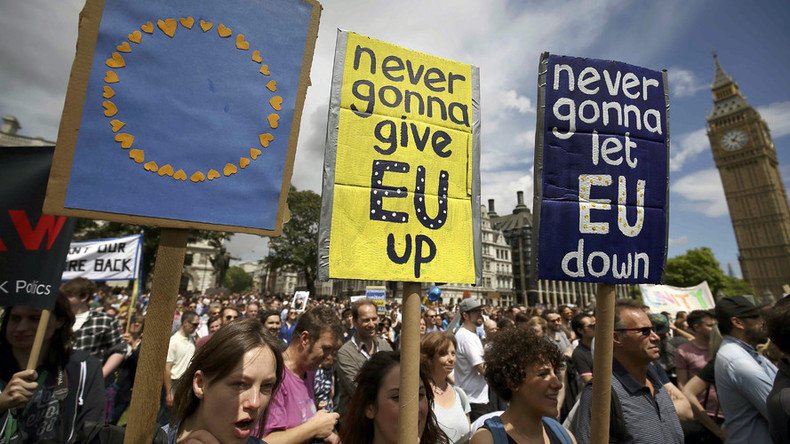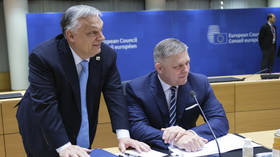‘No plans for Brexit in 2016... but we might do it anyway,’ says new UK govt

Prime Minister Theresa May does not plan to trigger Article 50 this year, government lawyers have told the High Court, before ambiguously admitting that stance could change.
Months of uncertainty over the UK’s future relationship with the EU could be in store after government lawyers indicated Downing Street has no firm position on whether or not to withdraw from the bloc before the end of 2016.
Britain’s exit from the European Union faced its first legal challenge in the High Court on Tuesday, when lawyers representing a number of challengers argued Article 50 – the formal divorce mechanism – cannot be triggered without parliamentary consent.
The court ordered that London-based investment manager Gina Miller’s legal petition should be the lead case for the challenge.
"Britain mustn't be defined by Brexit" says PM as EU dept moves into Downing St https://t.co/0s8QmmNerppic.twitter.com/RdWW8bRfOq
— RT UK (@RTUKnews) July 19, 2016
Law firm Mishcon de Reya is representing Miller, along with Deir Dos Santos, a British hairdresser, who has argued the result of last month’s referendum on Britain’s membership of the EU is not legally binding.
The government says its powers to trigger Article 50 without parliamentary consent are based on the royal prerogative.
The case will be heard by two senior judges in the divisional court on Tuesday. President of the Queen’s Bench division Sir Brian Leveson and Mr Justice Cranston, a former solicitor general under Tony Blair, will preside.
Mishcon de Reya and Dos Santos say they have received internet abuse since the cases went public. Brexit supporters rallied on Thursday outside the London office of the law firm.
May appoints "charming b*st*rd" David Davis as #Brexit minister https://t.co/aZWNW9gxVwpic.twitter.com/D44kZoAnb3
— RT UK (@RTUKnews) July 14, 2016
The Dos Santos claim argues: “The result of the referendum is not legally binding in the sense that it is advisory only and there is no obligation [on the government] to give effect to the referendum decision.
“However the [previous] prime minister has stated on numerous occasions that it is his intention to give effect to the referendum decision and organise the United Kingdom’s withdrawal from the European Union.
“The extract from [Cameron’s] resignation speech ... makes it clear that [the government] is of the view that the prime minister of the day has the power under article 50 (2) of the Lisbon treaty to trigger article 50 without reference to parliament.”
"Brexit means Brexit" says Theresa May, the next PM after Andrea Leadsom withdraws from leadership racehttps://t.co/dgum3i1eE3
— RT UK (@RTUKnews) July 11, 2016
Lawyers for Dos Santos argue the government’s claim of having royal prerogative over the issue is beyond its power because under the UK constitution, Parliament must give authorization for Brexit.
Most Westminster MPs back Britain remaining within the EU. If the case is successful however, and Parliament is given power to decide whether or not Britain leaves the bloc, MPs may come under pressure from their constituents to back Brexit.
A group of 1,000 barristers wrote to David Cameron before he resigned as PM urging him to seek Parliament’s consent before triggering Article 50.












